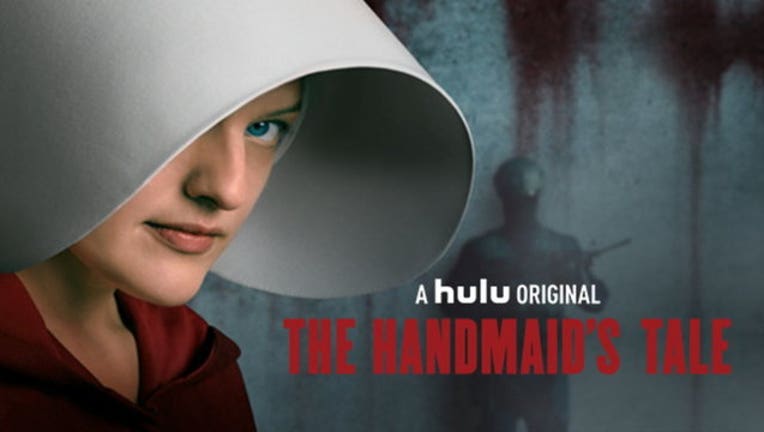'The Handmaid's Tale' wins the Emmy Award for best drama series

LOS ANGELES, CA (AP) - The dystopian series "The Handmaid's Tale" was crowned best TV drama on Sunday at the Emmy Awards, also winning best drama writing and directing and earning Elizabeth Moss a best actress statuette and Ann Dowd a best drama supporting actress award. "Veep" and "Saturday Night Live" were also big winners.
Sterling K. Brown won his second back-to-back Emmy for his role in the series "This Is Us" and in his speech honored Andre Braugher, who was the last black man to claim top drama performance honors, for "Homicide: Life on the Street" in 1998.
"It does feel different but for different reasons. I'm the first African-American in 16 years nominated. That kind of blows my mind," he said.
Moss won her first Emmy and thanked her mother in a speech that was peppered with expletives.
Donald Glover won the best comedy actor for "Atlanta," which he created and which carries his distinctive voice, while Julia Louis-Dreyfus was honored for a sixth time for her role as a self-absorbed politician in the comedy "Veep," named best comedy for the third time.
"I want to thank Trump for making black people No. 1 on the most oppressed list. He's the reason I'm probably up here," Glover said, acknowledging the entertainment industry's and the Emmys' tilt toward the nonstop political under President Donald Trump.
Combined with Emmys that Louis-Dreyfus has won for "Seinfeld" and "New Adventures of Old Christine," her latest trophy tied her with Cloris Leachman as the most-winning Emmy performer ever.
"Saturday Night Live" triumphed early for a season of skewering President Donald Trump, while the ceremony and host Stephen Colbert did likewise.
"I remember the first time we won this award," creator Lorne Michaels said in accepting the show's trophy for best variety sketch series. "It was after the first season in 1976. I remember thinking ... this was the high point," and there would never be "another season as crazy, as unpredictable, as frightening, as exhausting or as exhilarating. Turns out I was wrong."
The trophies for best supporting comedy acting went to Kate McKinnon, who played Hillary Clinton on "SNL," and Alec Baldwin for his Trump portrayal on the NBC show.
McKinnon thanked Clinton for her "grace and grit." Baldwin spoke directly to Trump, who has complained in the past that he was cheated out of a trophy for hosting "Celebrity Apprentice": "I suppose I should say, `At long last, Mr. President, here is your Emmy."'
Melissa McCarthy was honored at last weekend's creative arts Emmys as best guest actress for her "SNL" work, including portraying Sean Spicer. The former White House press secretary made a surprise Emmys appearance, wheeling in his own podium.
"This will be the largest audience to witness an Emmys, period. Both in person and around the world," Spicer shouted with authority, echoing his claim that Trump's inauguration crowd was the biggest ever and evoking McCarthy's manic portrayal of him.
Colbert's song-and-dance opening -- with help from Chance the Rapper -- included the song "Everything Is Better on TV," which repeatedly slammed Trump, mentioning his ties to Russia and including the lyric "even treason is better on TV."
John Lithgow, who received the best supporting drama actor for his role as British leader Winston Churchill in "The Crown," took a more diplomatic approach to political commentary.
"Most of all I have to thank Winston Churchill. In these crazy times, his life, even as an old man, reminds us what courage and leadership in government really looks like," Lithgow said.
Many celebrities wore blue ribbons support the American Civil Liberties Union, which sought to shed light on the plight of young immigrants facing the potential of being deported.
"Big Little Lies" won the limited series award, with Nicole Kidman taking the lead actress award and supporting honors going to her castmates Alexander Skarsgard and Laura Dern.
"More great roles for women, please," said Kidman as she and her fellow executive producer and co-star Reese Witherspoon accepted the miniseries' award.
Riz Ahmed was honored as best limited series actor for "The Night Of." "Black Mirror: San Junipero" was named best TV movie.
Lena Waithe became the first African-American woman to win an Emmy for comedy series writing, for "Master of None," sharing the award with series co-creator Aziz Ansari, who is of Indian heritage.
"The things that make us different, those are superpowers," Waithe said. "Thank you for embracing a little Indian boy from South Carolina and a little queer black girl from the south side of Chicago," she said, basking in a standing ovation from the theater audience.
TV academy President and CEO Hayma Washington paid tribute to TV's increasing diversity. That was reflected in the record number of African-American continuing series acting nominees, but Latinos were overlooked and Ansari was the only Asian-American contender.
"The Voice" won the reality competition category. "Last Week Tonight with John Oliver" won the award for variety talk series, prompting also-rans Colbert and Jimmy Kimmel to jokingly raise a glass to each other and speculate maybe the wrong name was announced.
The "In Memorian" segment had several notable exclusions, including Dick Gregory and Harry Dean Stanton.

